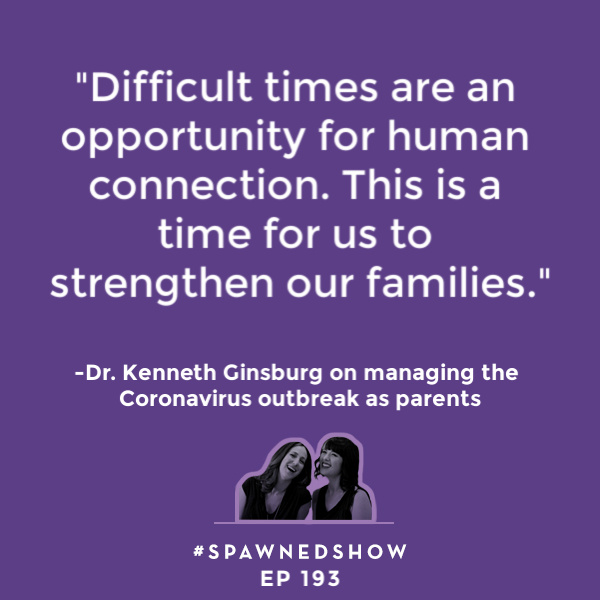As the COVID-19/Coronavirus outbreak has increased, and life as we know it seems to be changing by the second beyond our control, parents are really struggling. A lot. I knew right away we needed to have a conversation with Dr. Ken Ginsburg, pediatrician and adolescent expert from The Center for Parent and Teen Communication at the Children’s Hospital of Philadelphia.
He was one of our favorite podcast guests of 2019 (our sound engineer called him “a modern day Mr. Rogers”) and whether you’re raising kids or teens or even young adults, I know this conversation will be a huge source of expert help, resources, and reassurance at a time we could all use more of it.
It’s no exaggeration to say that this episode is a must-listen.
Tip: Say “I don’t know” if you don’t know the answer. We’re not trying give false reassurances, we’re trying to build safety and predictability.
I think what’s particularly important is to recognize that managing Coronavirus as a parent is not just about checking in on how our kids are feeling physically, or telling them to wash their hands nonstop. It’s also being aware of the emotional toll it may be taking as life is disrupted.
There are all kinds of of gatherings and events being cancelled, and of course, an increasing number of schools that are temporarily closing or moving to online learning around the country. And while it’s all done for good reason, it doesn’t make it easier on kids.
My social media and IRL community of parents are sharing such heartbreaking stories of cancelled school trips and spring break vacations, recitals and school plays, spelling bees and Junior Olympics swim meets. Even the cancelation or postponement of a birthday party can be devastating for a child, and it may hard to know what to say when our kids have been looking forward to these events for weeks or months.
We can’t so easily dismiss it as, “oh, there will be more parties.”
And that’s where Dr. Ginsburg comes in.
I really hope this conversation helps give you lots of the help and support we’ve all been looking for, and to even see some positive, longterm changes that can come out of it for families.
As Dr. Ginsburg offered in this helpful mantra: Difficult times are an opportunity for human connection. This is a time for us to strengthen our families.”
Please listen right now.
Some of the important topics we discuss about managing Coronavirus fears in our kids
– It all starts with how we behave as parents; how to moderate your own anxiety, be careful about oversharing information, and practice co-regulation to be the calming influence our kids need.
– How to trust and validate kids’ fears, feelings and experiences — what to say and what not to say
– How to help our partners, spouses or own parents who may be “oversharing” or panicking.
– Positive, helpful ways to talk about lots of aspects of the current situation

– Reframing time home as extra time home as a family
– Acknowledging FOMO and social isolation challenges that impact kids differently
– “The language of resilience.”
– How to identify signs of anxiety that may indicate our kids need more help than we can give them, and what to do if our kids do need professional help managing their fears and anxieties
– The bigger picture: The life lessons we’re teaching our kids through all of this, and how it can help us build healthy parent-child relationships for the long term.
Other helpful resources based on our discussion
 Malaka Gharib/ NPR
Malaka Gharib/ NPR
– If you need a basic way to explain Novel Coronavirus, which may help kids understand why their event is being cancelled, and why they’re safer than they may feel, this wonderful Coronavirus comic from NPR, illustrated by Malaka Gharib (I Was Their American Dream) is fantastic. It’s designed to be printed and folded into a zine. I love that it’s straightforward, clear, and reassuring.
– Older kids can look at infection disease specialist Dr. Siouxie Wiles’ animated GIF about flattening the curve, illustrated by Toby Morris. It can be found in this helpful article in The Spinoff, that explains the premise of containment / social isolation or distancing, and why they’re so essential to getting ahead of any health epidemic.
– Lisa Damour, one of our favorite parenting authors (and Dr. Ginsburg agrees!) has a terrific article in The New York Times that we discussed, in which she shares 5 ways to help ease anxiety in teens about Coronavirus. Her number one tip: Normalize their anxiety. (Just like we discussed in the podcast.)
I love that she writes: Adults can help young people appreciate that healthy anxiety has a purpose: It alerts us to potential threats and helps us move toward safety. “Feeling some anxiety,” we might say calmly, “makes sense right now. You’re having the right reaction to the emerging news about the coronavirus.
– Dr. Ginsburg’s article on How parents can help improve teens’ mental health is a fantastic guide for now and the future. He also highly recommends this piece on getting teens professional help, which he calls one of the most important articles he’s written. Info includes signs of trouble to watch out for, differentiating adolescent depression from anxiety, how to be the adult your children will talk with, and the best ways to actually seek help for your kids and support them during tough emotional times.
– A list of trusted resources we should visit to get our facts and help battle misinformation. which can be a huge issue for kids in this social media age. Dr. Ginsburg suggests we trust the information from the CDC and from reports from our local and state officials, and to be sure to have those “fake news” conversations with our kids.
– A good list of things you can stock up that you might not have considered, including board games and craft supplies for family activities to encourage more bonding time together, and keep the “I’m bored” complaints to a minimum.
If you want to talk more about this, get some help from our community, or share how your family is handling things right now, please join the Spawned Podcast Community on Facebook. We’re all in this together.
Top image:Prateek Katyal on Unsplash



